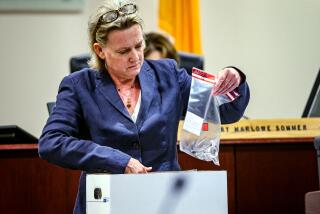More Judges Turning to Rearguing
- Share via
A jury interrupted deliberations in a double-murder case Thursday to hear a new round of closing arguments, a practice once unheard of that has become increasingly common in the courtrooms of reform-minded judges.
Jurors in the trial of Randall Williams, accused of the West Hills killing of two witnesses, had reported they were headed for a deadlock. So rather than declare a mistrial, Los Angeles County Superior Court Judge Terry A. Green asked lawyers to address written questions from jurors on Thursday.
It’s one of the latest trends in jury reform, urged by state judicial educators and already commonplace in Arizona. Though still rare in most of California, in Los Angeles County Superior Court--the largest court system in the nation--the practice has been gaining wider acceptance.
“Judges have been criticized by appellate courts for not being responsive to jurors’ questions,” said Los Angeles County Superior Court Judge Jacqueline Connor, who chairs the court’s trial jurors committee. As a result, she said, trial judges have been trying to change their courtroom practices to be more sensitive to jurors’ concerns.
Trend Is to Assist Jurors
In the judges’ handbook on jury management, published in January by the California Center for Judicial Education and Research in San Francisco, the authors suggest that judges ask struggling jurors “whether reopening argument might be helpful.”
“The trend is to assist jurors to make better decisions and provide them with the tools they need,” said Judge Judith McConnell of the San Diego County Superior Court, a jury expert.
Other innovations include giving jurors preliminary instructions at the start of trial, letting them take notes during testimony, and giving them written copies of jury instructions--which often involve complicated legal language--so they can read along with the judge.
The idea of reopening arguments has been around for at least a decade, said G. Thomas Munsterman, a jury consultant with the National Center for State Courts in Williamsburg, Va. He said he first heard about the practice in 1990 when a federal court in Michigan upheld a civil jury verdict after a judge reopened arguments to help a jury decide the case. In 1996, Arizona became the first state to formally implement the technique in both civil and criminal cases, said retired Judge B. Michael Dann of Phoenix.
The practice is rarer elsewhere, because few judges are aware they have that option, Munsterman said.
In Los Angeles, a group of judges--including Green--have been exploring such new courtroom techniques for the last few years. Green, who is still presiding over Williams’ pending case, declined comment.
Connor, who said she was not commenting on the Williams trial, cited a 1999 study in Los Angeles that found that jurors overwhelmingly favor the use of written questions.
Connor has presided over about a dozen rearguments. She said the practice has helped avert five mistrials in her courtroom in eight months, with verdicts that included acquittals as well as convictions.
Some Disapprove of Answering Questions
Some in the legal profession question the fairness of allowing attorneys to answer questions put by deliberating jurors. A juror might ask for additional evidence, acting as a second prosecutor, said Michael Yamamoto, a criminal defense lawyer and a member of the state Judicial Council’s Jury System Improvement advisory committee.
Defense attorneys also sometimes welcome hung juries because they can offer defendants bargaining power in a retrial, judges said.
In the Williams case Thursday, Deputy Public Defender Michael Gottlieb and Deputy Dist. Atty. Jessica Dabney took turns arguing anew before the jury, which began deliberations a week ago.
“We’ve invested enormous resources in this case,” Green said of the trial, which began with jury selection in December and has involved nearly four months of testimony from 100 witnesses. If the jury cannot decide, “so be it,” the judge said. He added: “I want to give them every opportunity to [reach a verdict] if they can.”
Williams, 36, is charged with first-degree murder in the deaths of Jamie Navaroli and April Mahoney, witnesses in a burglary case against Williams’ friend Kenneth Leighton. Prosecutors alleged that Leighton wanted the witnesses dead, so he enlisted Williams to shoot them. Leighton was convicted of first-degree murder Tuesday by a separate jury. Williams’ jury will resume deliberations Tuesday.
More to Read
Sign up for Essential California
The most important California stories and recommendations in your inbox every morning.
You may occasionally receive promotional content from the Los Angeles Times.













